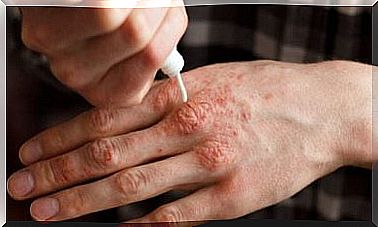Isotretinoin For Acne: Benefits And Side Effects

Are you using isotretinoin for acne? Today, we will discuss the benefits and side effects of this drug.
Isotretinoin is a useful drug for the treatment of moderate to severe acne. It is available as 10, 20 and 40 milligram capsules and is estimated to be effective in 80% of cases. The average treatment lasts 4 to 5 months. Doctors also sometimes prescribe isotretinoin to treat other skin problems or even some cancers.
Despite its effectiveness, it can cause significant side effects. For example, it causes birth defects, so pregnant women should not use it. Also, you should never use it at the same time as vitamin A supplements.
Let’s take a closer look!
What is isotretinoin used for?
Although isotretinoin is useful for the treatment of various types of acne, doctors almost always prescribe it to treat a severe form called severe recalcitrant nodular acne. Doctors usually recommend it only when other approaches have not worked.
It is one of the most effective acne medications. Also, in some cases, doctors prescribe it to treat problems such as rosacea, suppurative hydrosadenitis, debilitating folliculitis, chronic dermatitis of the hands, photoaging of the skin and psoriasis. At the same time, professionals have been recommending it for the treatment of some types of skin cancer since 1980.
Isotretinoin is a multi-level drug. It has a comedolytic action, ie it prevents clogging of the pores, which gives rise to comedones or blackheads. This causes a significant improvement in lesions that are already present and prevents the appearance of new ones.
This medicine inhibits the growth of a bacterium called Propionibacterium acnes. The microorganism is found naturally on the skin, but its spread causes various infections, including acne.
Isotretinoin also has anti-inflammatory action. One of its main benefits is the decrease in sebum production. This makes it very effective against various skin problems.

Side effects of isotretinoin
The side effects of isotretinoin can be mild or severe. Among the first to occur are dehydration that affects the skin, lips, nose and eyes. This leads to chapped lips, nosebleeds and dry eyes.
These side effects almost always go away on their own. Otherwise, it is important to consult a doctor. At the same time, this drug can cause more serious reactions, which we will analyze below.
Isotretinoin for acne: precautions before taking the medicine

Each person should be informed in detail about the possible side effects of isotretinoin. In some cases, you may need to sign an informed consent form. The patient should tell their doctor about any other medicines, supplements or substances they take on a regular basis.
Many of the worst effects of isotretinoin are related to pregnancy. A pregnant or breastfeeding woman should not take this medicine. Neither does the woman who intends to become pregnant. Isotretinoin can cause miscarriage, premature birth or birth defects.
If a woman is taking this medicine, she must make sure that she uses reliable contraception. In men, the substance can get into the semen. Experts do not know if this has any effect on the fertilization of an egg. Therefore, men should exercise caution in this regard.
Isotretinoin for acne: a medicine that requires caution
It should be noted that some of the side effects caused by isotretinoin are reversible, but others are not. Sometimes it is enough for the patient to stop taking the medicine. In other cases, the damage is permanent.
Such a substance should be taken with caution. The instructions must be followed precisely. Prescribed tests should be performed and the physician should be informed of any changes.









